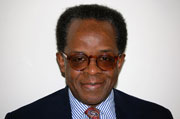
Doubting Black voters
By Lee A. Daniels, George Curry Media Columnist
If it’s presidential-primary time it’s a given a significant part of the political discourse will involve dissing Black voters.
Sometimes this gambit takes the form of citing Blacks’ reliable massive support for the Democratic Party as proof they don’t “understand” the issues at stake and who their real political “friends” are. Or, it takes the opposite tack – of using differences of opinion among Black Democrats – for example, those who support Hillary Clinton versus those who support Bernie Sanders – as proof that Blacks are “split” and ineffective in marshaling their voting power.
In other words, Black voting patterns are widely consistently discussed as if they reflect a lack of political sophistication.
Nothing, however, could be further from the truth.
This perverted discourse almost always ignores or discounts such things as the fact that eight years ago Black voters, first, effectively and quickly insured the Democratic primary contest would be between Barack Obama and Hillary Clinton. Then, they switch-ed massively to Obama only when he won the Iowa caucus in January 2008 – which they correctly saw as evidence that Obama had forged a sophisticated campaign and that a substantial number of white voters would support a Black man for the presidency.
And this perverted discourse usually ignores the fact that the Black-voter turnout, which in 2012 surpassed that of Whites for the first time, had been rising significantly since Bill Clinton’s first election in 1992. In other words, it wasn’t just the imperative of electing the Black presidential candidate in 2008 and re-electing the Black President in 2012 that was pushing more and more Blacks to vote.
In addition, Black voters’ actions at the national, state and local levels are rarely discussed in terms of the consistently racist character of the GOP itself. It’s rarely acknowledged that they, shunned for a half century by the GOP, have expertly played the traditionally American two-party game within the Democratic Party to become its bedrock voting bloc.
And it’s rarely stated that Black voters saved the Democratic Party from collapsing during the 1980s-1990s “wilderness years” of the presidencies of Ronald Reagan and George H.W. Bush.
It’s also rarely stated that Jewish-Americans, too, are a reliable majority Democratic voting bloc; and that Asian-Americans, Hispanic-Americans, and Muslim-Americans have become so as well. No one questions whether these groups are too “emotionally” attached to the Democratic Party.
Such disrespect of Black voters has been the standard operating procedure of conservatives since the 1960s.
One can hear it in the “free stuff” excuses Mitt Romney made after his “shellacking” in the 2012 election – a remark that was echoed last fall by Jeb Bush in the midst of his free-fall from contention in this season’s GOP presidential sweepstakes. And recently Bill O’Reilly showed off – again – his credentials as an arch-racist by asking his buddy Donald Trump how he could create job opportunities for Blacks and gain Black votes when many African Americans are “ill-educated and have tattoos on their foreheads.”
But there’s another way to consider such attitudes, beyond their merely proving how persistent individual and institutional racism remains in America. That is to see them as a perverted way of acknowledging that Black voters are a powerful force in presidential-election politics.
Last week, again, that force was on full display in Hillary Clinton’s substantial victory over Bernie Sanders in the New York Democratic primary. In blunt terms, Clinton swept Sanders,
gaining 58 percent of the vote to Sanders 42 percent in a contest that some had predicted would be much closer. That error in judgment was likely due to mistaking the massive crowds that showed up at Sanders’s rock-concert-like rallies as consisting entirely of voters. But the primary results – which one analyst called “a devastating result for the Sanders campaign” – showed those events and the millions Sanders’s campaign spent on television and radio advertising in the state hid a hollowness at its center.
According to the exit polls, Clinton’s ground-game approach won nearly all the categories: From income groups (those voters who make under $30,000 annually to those who make more than $100,000), to voters grouped by level of education, to those grouped by age (excepting the 18 to 29 cohort, which is less than one-fifth of Democratic voters).
Significantly, Clinton swamped Sanders in race and gender terms. He narrowly won the White vote on the strength of the White-male vote. But Clinton won the votes of White women by an equal margin, and, in addition, won 75 percent of the Black vote and 68 percent of the vote of other New Yorkers of color.
In other words, for all that’s said about Black voters having an unthinking, “emotional” attachment to the Clintons, it appears lots of other Democratic voters in New York and the other states whose voters have given her an all but insurmountable lead for the Democratic nomination feel the same way.
So, let’s be clear about what the “feeling” is: It’s about making a pragmatic choice of who is the best person to ensure that the presidency of the United States stays out of the grasp of the party that doesn’t deserve it and in the grasp of the party that does.
Lee A. Daniels, a former reporter for The Washington Post and the New York Times, is also a former editor of The National Urban League’s The State of Black America. He is a keynote speaker and author whose books include Last Chance: The Political Threat to Black America. He is writing a book on the Obama years and the 2016 election. He can be reached at leedanielsjournalist@gmail.com
